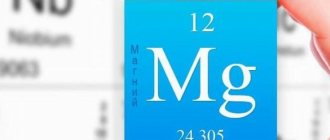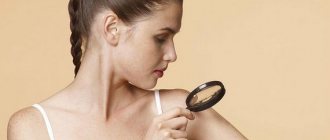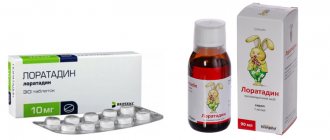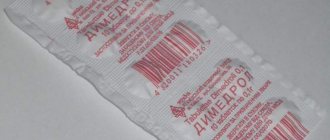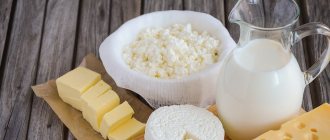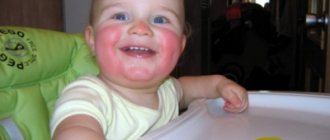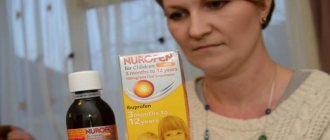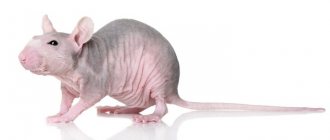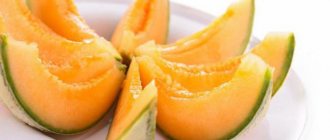An allergic reaction of the body to an irritant may appear suddenly. Some people suffer from allergies from birth, while others develop them. The most common allergens are foods, pet hair, pollen, medications, and cosmetics. Washing powder is considered one of the strongest irritants. It can cause allergies in people of any age. To minimize the risk of attacks and discomfort, you need to be able to choose the right composition for washing. Let's figure out how to prevent allergies to washing powder, what components should or should not be included in the ideal product.
Causes
First you need to understand what an allergic reaction is. Strictly speaking, this is a reaction of the immune system to a certain substance that it perceives as foreign, hostile, harmful. In most cases, the cause of such an allergic reaction is a malfunction of the immune system.
As soon as the allergen enters the body, antibodies begin to be released en masse in the blood, the task of which is to expel the stranger. It is these antibodies that cause all the unpleasant and sometimes dangerous symptoms.
An allergic reaction to washing powder is associated with the chemicals that manufacturers add to it:
- bleaches;
- flavorings;
- dyes.
This is a very aggressive “chemistry”; if the patient has problems with the immune system, then allergies cannot be avoided.
At particular risk are those people who do not take care of their health, undermining the strength of the body's natural defense system (immunity). For example, an infectious disease that is not treated in time, smoking, alcohol abuse, and an improper daily routine make the body weakened. Such people have a particularly high chance of developing an allergy to washing powder.
SODASAN Comfort Sensitive
Rating: 4.3
Approximate price: 1150 rub.
Contains an extract of organic herbal soap, produced without the addition of foreign impurities and substances that have a negative effect on the body. Ideal for washing children's colored and dark clothes. The formula allows you to preserve the original colors of clothes without washing them out.
[/su_column]
[/su_column]
[/su_row]
Why do you need to wash children's clothes with a special powder?
A child's health is much weaker than that of an adult. His immunity has not yet fully developed; he is not able to fully resist infections and external irritants, including allergens.
Even the most harmless substances can cause a powerful allergic reaction in a baby, for example, milk. What can we say about the aggressive chemical compounds that make up “adult” washing powders.
Realizing this, manufacturers of household chemicals produce special children's washing powders. The main difference from the “classics” is that they practically do not contain synthetic substances. They are based on natural ingredients that almost never cause allergies. But you still need to be careful - a child’s body sometimes develops severe allergies even to hypoallergenic substances.
Important! To reduce the risk of a negative reaction in a child, you should rinse the laundry thoroughly, especially if you use “adult” powder. It has been experimentally established that some phosphates are completely washed out of clothes only after the eighth rinse.
Top 5 best brands
The best modern hypoallergenic powders:
Chistown
Its composition is completely natural. It contains soap, soda and citric acid. This product can be used for washing:
- children's things,
- pregnant lactating women,
- people suffering from allergies.
It does not cause skin irritation, cannot provoke respiratory tract spasms, and does not harm the environment.
The cost of a 0.6 kg package is 170 rubles. Reviews can be found here, here and here. This article will tell you more about Chistown detergents.
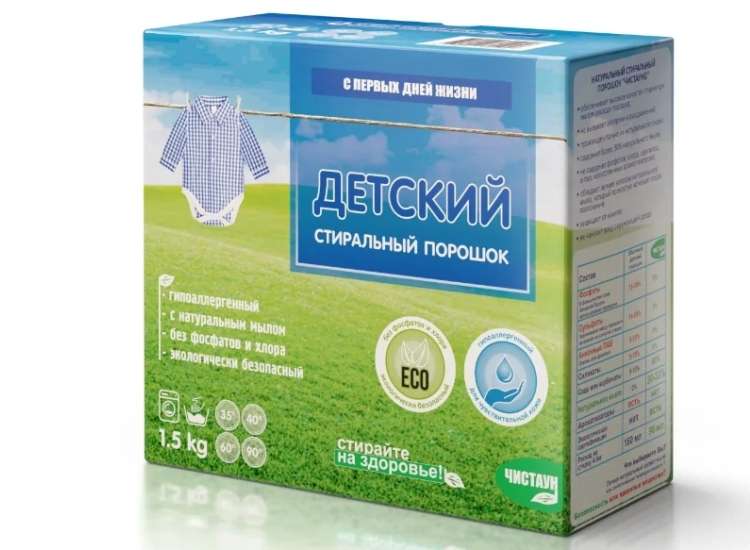
Sodsan
This is a concentrated washing powder based on organic herbal soap. It does not contain fragrances or fragrances and does not contain phosphates . At the same time, the composition is distinguished by high quality washing. It can be used to take care of babies' belongings.
The cost of a package weighing 1.2 kg is 1250 rubles. You will find reviews on this and this review site.
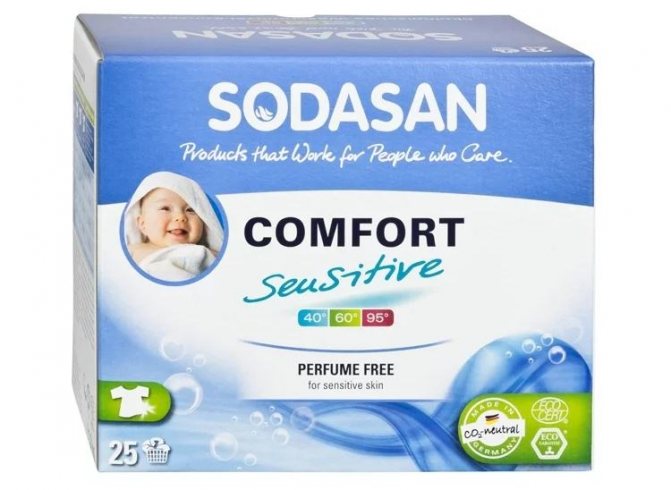
Klar Vollwaschmittel
Soap nut based washing powder. This composition is recommended for people suffering from allergies and asthma . In addition to natural soap, the formula contains safe organic components designed to improve the quality of washing. The powder is used sparingly.
The price of a package weighing 1100 g is 1500 rubles. Read reviews here and here.
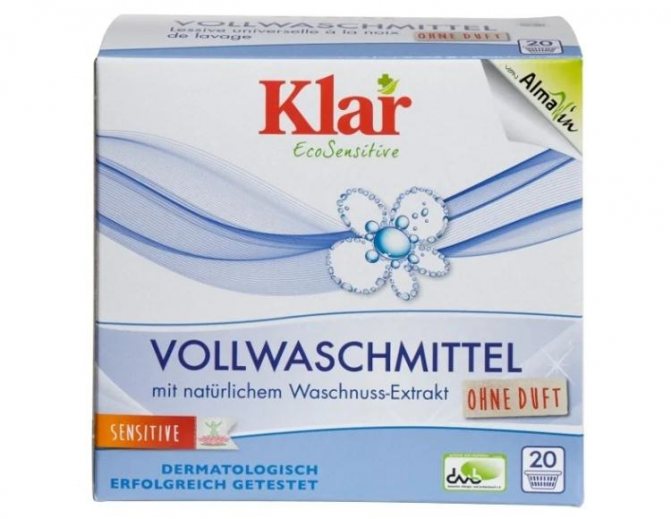
Garden Eco Kids
This is an environmentally friendly composition that does not contain fragrances or fragrances . For high-quality cleaning and deodorizing of linen, the formula is reinforced with silver ions.
The base of the detergent is soap, soda and citric acid. The powder is suitable for all types of fabric and for any type of washing.
The cost of a package weighing 1.4 kg is 400 rubles. Reviews can be found here, here and here.
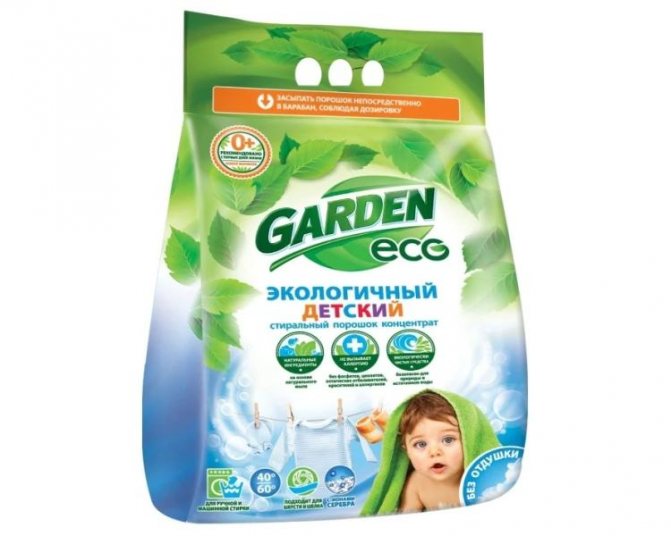
Bio Mio
Hypoallergenic powder contains:
- cotton extract,
- enzymes,
- biodegradable bleaches.
The composition is economical in consumption. It works well on various types of stains and can be used for hand and machine washing.
The cost of packaging 1.5 kg is 430 rubles. Read reviews here and here. This article will tell you more about BioMio washing powder.
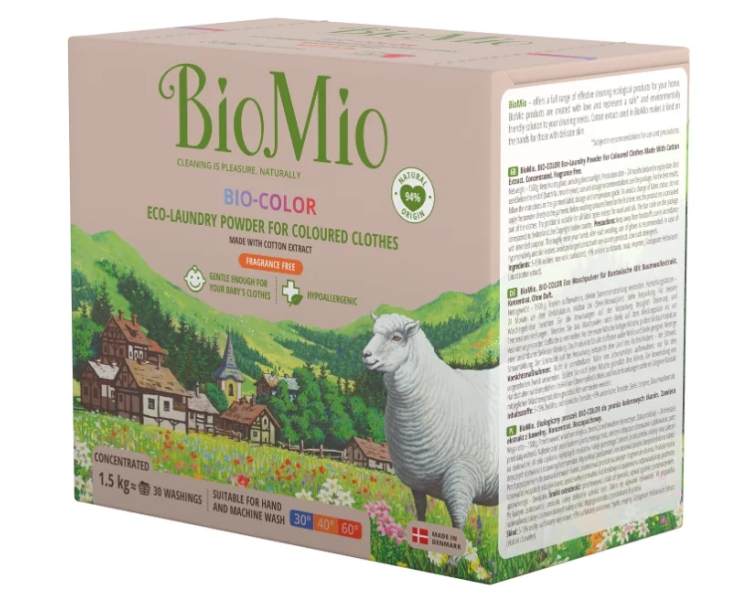
Symptoms
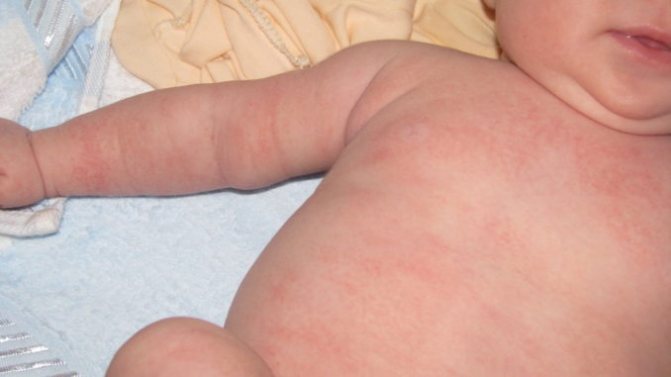
Since washing powder does not penetrate the esophagus, but comes into contact mainly with the skin and respiratory tract, the symptoms of an allergic reaction to it will be very characteristic. It is quite difficult to confuse it with an allergy to other irritants.
The main features include:
- skin rashes;
- itching;
- swelling on the skin, forming small seals;
- sneezing;
- cough.
Signs of an allergy to washing powder appear approximately 4-8 hours after contact with the irritant. Sometimes this period increases to two days, and in some cases symptoms appear almost instantly. Please note that in this case we can talk about anaphylactic shock, which poses a fatal danger to both children and adult patients.
In some cases, dizziness with nausea and vomiting is added to the main symptoms. In this case, the patient experiences severe weakness, sometimes reaching the point of loss of consciousness. Since these signs resemble the symptoms of colds, you need to pay attention to the lymph nodes - in the case of allergies, they will not always increase, although this is likely.
Important! Symptoms of rhinitis such as sneezing and coughing are quite rare. Most often this is due to the general weakening of the body, and the resulting general allergic predisposition of the patient.
How does it manifest?
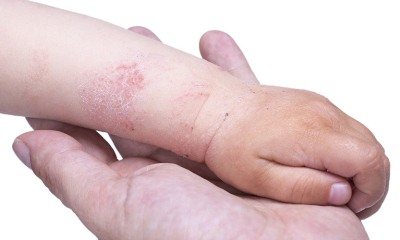
Usually the skin is without visible damage, however, in severe cases, papules (vesicles) with liquid contents may form.
Dermatitis is accompanied by itching , and by scratching such papules the child damages them. The liquid pours out, leaving a small wound.
If nothing is done, the problem grows like an avalanche: the baby scratches the skin until a wound forms, which, without proper treatment, can become infected. Allergies include abscesses and cracks in the skin. The area of inflamed areas increases.
Diagnostics
The symptoms differ in brightness; they are characteristic of this type of irritant. Thus, diagnostics usually does not cause difficulties for a specialist. However, in some cases the patient could come into contact with several irritants at once. This can make the diagnosis somewhat more difficult. In addition, patients themselves incorrectly assess the symptoms that have arisen, which leads to incorrect home treatment.
You can contact a therapist or allergist with the problem. The doctor will take a medical history, during which he will determine:
- time of last contact with a potential allergen;
- interaction with other possible stimuli;
- previous infectious diseases;
- medications taken;
- possible unfavorable heredity;
- presence of bad habits.
The specialist will also try to find out whether the patient follows a daily routine and diet. All the factors mentioned above directly affect the level of the body's immune defense.
After receiving comprehensive information, the doctor will prescribe tests. Their task is not so much to establish the allergic reaction itself, but to identify additional provoking factors for its development. The therapeutic strategy largely depends on the results of these tests.
- Prick test . The test involves applying a small amount of the allergen to the skin. For some time, the doctor assesses the patient’s condition and his reaction to the stimulus.
- PCR for infectious diseases . If you do not fight them, then treating allergies may be pointless - the immune system will constantly “give way”.
- Blood test for antibodies . This test confirms the presence of an allergy, excluding other possible causes of symptoms.
Additionally, tests of urine, feces, discharge from the genitals and respiratory tract may be prescribed. These tests identify associated diseases that require treatment, and also affect the drugs used during therapy.
Important! The patient can independently diagnose at home. To do this, you need to keep a diary of symptoms, daily recording the dynamics of the appearance and disappearance of symptoms. Naturally, this data must be linked to the time of contact with washing powder.
Treatment
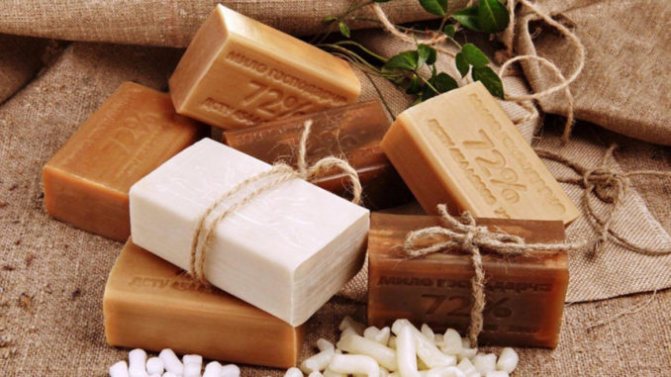
Allergies cannot be ignored; this can lead to dire consequences, including death (anaphylactic shock and Quincke's edema). Self-selection of medications is acceptable, but not recommended. Typically, self-medication is resorted to by those patients who rarely experience an allergy to washing powder, and the symptoms are not severe and do not cause serious concern. In all other cases, consultation with a doctor is necessary.
Therapy begins with isolating the patient from the allergen. Washing powder is an integral part of the household, and it is difficult to give it up. However, there are options:
- laundry soap;
- special detergents that do not contain phosphates, fragrances and dyes;
- special hypoallergenic powders (expensive, rare, and difficult to wash).
A good solution is to use baby detergents. They wash clothes well, but consist mostly of natural ingredients.
After isolation from the allergen, we begin drug treatment; drugs should be taken only when symptoms appear, unless otherwise prescribed by a doctor.
Please note that the specialist’s recommendations for taking antihistamines must be strictly followed, even if they contradict the instructions for the drug. The best proven ones:
- Zodak;
- Zyrtec;
- Suprastin;
- Tavegil;
- Claritin.
Antihistamines are not recommended to be taken more than once a day. If your health does not improve with this regimen, you should seek treatment at the hospital.
An important part of therapy is strengthening the immune system. If the body’s defenses work “every other time,” then not a single medicine will help, even the most expensive and advertised one. To maintain immunity you should:
- take vitamins and mineral complexes;
- add vegetables and fruits to your diet;
- organize your daily routine;
- avoid stressful situations;
- at least for a while, give up long-distance flights and sudden changes in time zones;
- resort to periodic physical activity.
Compliance with these rules will make an allergy to washing powder a very rare guest, and its treatment will be easy and quick.
PURE WATER - hypoallergenic, odorless powder
Rating: 4.5
Approximate price: 238 rub.
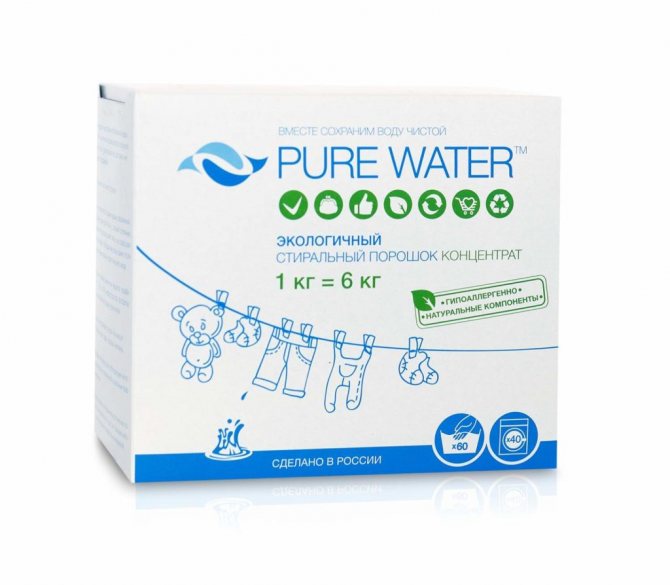
Powder is a concentrate containing active biodegradable ingredients that help maintain the environment. Pure water is designed for various types of washes; at low temperatures it can remove the most stubborn stains. Can be used for washing clothes of newborns and babies.
[/su_column]
[/su_column]
[/su_row]
Anaphylactic shock
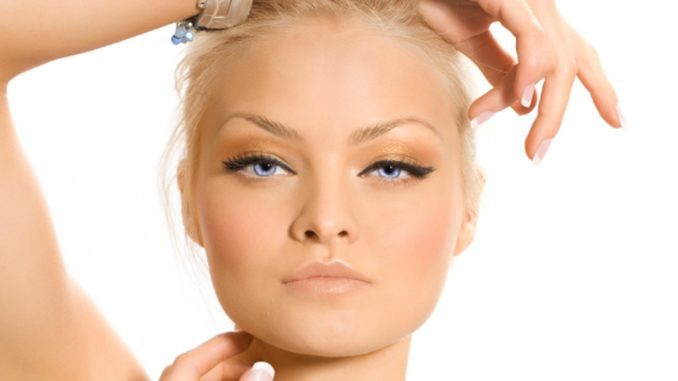
With simultaneous contact with a large amount of allergen, anaphylactic shock may occur. The patient's blood pressure drops sharply, consciousness becomes foggy, and the person faints. At the same time, Quincke's edema begins - due to swelling of the neck and lower part of the head, breathing becomes difficult, and the patient may die.
There is no need to panic, the procedure is as follows:
- call an ambulance;
- we give the patient an antihistamine (any drug, there’s no choice);
- We place the patient on his back, turning his head to the side;
- We constantly measure the pressure (every five minutes maximum).
One of the best remedies for anaphylactic shock is adrenaline . If you have it in your home medicine cabinet, you need to give it an injection. In the absence of the treasured ampoule, you can cause severe pain to the patient by injecting him in the buttock with a hairpin or needle (do not overdo it). Discomfortable sensations will cause a rush of adrenaline into the blood, which will improve the patient’s condition.
Important! You should not refuse hospitalization, anaphylactic shock does not go away without a trace, you need temporary supervision by a specialist, and in a clinical setting. In addition, the hospital will clean the blood from allergen residues.
Allergy to washing powder cannot be called a rare and safe phenomenon. On average, every sixth modern person encounters it. The symptoms cause the patient a lot of discomfort, but diagnosis and treatment usually do not cause difficulties. Anaphylactic shock, which can lead to death, is especially dangerous. If it occurs, you should immediately call a team of emergency doctors. Take care of yourself and your loved ones!
